Bilingual Lecture Series on Iran
-
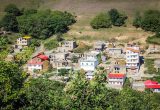
Economic and Social Transformation in Aliabad: New Trends in Work, Life Styles, Marriage, and Sexuality
A lecture in English by Dr. Mary HeglandRapid change was already reaching Aliabad in 1978-1979. Land reform and the shift from agriculture, low-level shop-keeping, and itinerant trading to factory work, construction, services, and government employment were affecting kinship and extended family dynamics, cutting back on the authority of the older generation and bringing new opportunities to the younger generation. Today, extended family and community ties have declined as people develop more individualized lives. Many men work outside of Aliabad. Many people, especially the young, consider themselves to be Shirazis. Aliabad has been formally incorporated into Shiraz. In spite of Islamic Republic teachings, changes in gender, marriage, and sexuality have been dramatic. Today, young people take a much more active role in choosing a spouse. Like elsewhere in Iran, girls marry and bear children later, raise smaller families, live separately from in-laws, sometimes divorce husbands, and sometimes work outside of the home. Contact between males and females takes place before marriage; some engage in extra-marital affairs, and a few individuals have expressed their wish to have a “white marriage” before a long-term commitment. The cultural and sexual revolutions have entered even the former village of Aliabad.
-
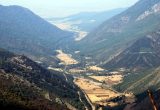
Days of Revolution: “Aliabad” of Shiraz in Iran and in the World in the 20th and 21st Centuries
A lecture in Persian by Dr. Mary HeglandResearch in Aliabad between 1978 and 2018 allows examination of how national and international politics can affect people on the ground and how local politics and “ordinary” people can affect national and international politics. Even the village of Aliabad was part of the world scene from an early stage. In areas around Shiraz, the Qavam family gained power through international trade through the Gulf, helping provide England with the opium they wanted to exchange with China in return for tea, porcelain, and silk. Because of this, the Qavams were able to take ownership and control of Aliabad and many other villages. US political pressures – specifically Kennedy’s push for land reform and the English and American-engineered coup against Minister Mossadeq – brought political conflict to Aliabad. During the 1979 Iranian Revolution, villagers who participated with millions of other Iranians brought about drastic national and international change. Now laptops, travel, and communication bring them into closer contact with the outside world, but the economic sanctions cause economic difficulties and dissatisfaction.
-
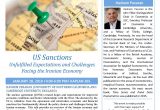
US Sanctions: Unfulfilled Expectations and Challenges Facing the Iranian Economy
A lecture in English by Dr. Hashem PesaranThe nuclear agreement (JCPOA) created hopes and expectations for improved economic conditions and better relationships with the West. The decision by the US to withdraw from the agreement and reintroduce economic and financial sanctions has fundamentally altered the policy choices and challenges facing the Iranian economy. This talk provides an overview of the Iranian economy and discusses existing empirical evidence on the effects of past sanctions, in particular the 2012-2015 UN sanctions that led to the JCPOA. It compares and contrasts the new round of US sanctions with the earlier ones and considers their implications for the Islamic Republic’s economic strategies and their likely short-term and long-term consequences for output growth, inflation, unemployment, and currency stability.
In the past when faced with sanctions, the Iranian government has generally opted for short-term populist policies, increased government interventions, and the expansion of rent seeking activities at the expense of badly needed reforms for longer term enhanced efficiencies and sustained economic and environmental development. Should we expect more of the same, or are there other possibilities?
-
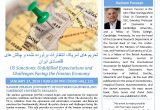
US Sanctions: Unfulfilled Expectations and Challenges Facing the Iranian Economy
A lecture in Persian by Dr. Hashem PesaranThe nuclear agreement (JCPOA) created hopes and expectations for improved economic conditions and better relationships with the West. The decision by the US to withdraw from the agreement and reintroduce economic and financial sanctions has fundamentally altered the policy choices and challenges facing the Iranian economy. This talk provides an overview of the Iranian economy and discusses existing empirical evidence on the effects of past sanctions, in particular the 2012-2015 UN sanctions that led to the JCPOA. It compares and contrasts the new round of US sanctions with the earlier ones and considers their implications for the Islamic Republic’s economic strategies and their likely short-term and long-term consequences for output growth, inflation, unemployment, and currency stability.
In the past when faced with sanctions, the Iranian government has generally opted for short-term populist policies, increased government interventions, and the expansion of rent seeking activities at the expense of badly needed reforms for longer term enhanced efficiencies and sustained economic and environmental development. Should we expect more of the same, or are there other possibilities?
-
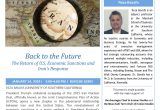
Back to the Future The Return of U.S. Economic Sanctions and Iran’s Response
A lecture in English by Dr. Reza BavafaPresident Trump’s unilateral scrapping of the 2015 Iran Nuclear Deal, officially known as the Joint Comprehensive Plan of Action (JCPOA), opens a new chapter in the adversarial relationship between Iran and the United States. The reinstatement of economic sanctions is a major setback to President Rouhani’s reformist policies, which aimed at taming high inflation and reducing unemployment while opening up the economy to muchneeded foreign investment. It also emboldens the hardliners who use the sanctions as both a reaffirmation of their mistrust in the U.S. and a justification for reclaiming some of their lost political and economic influence. The economic hardship that accompanies such sanctions, meanwhile, is borne by ordinary Iranians who have suffered repeatedly from such crises.
-
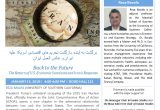
Back to the Future The Return of U.S. Economic Sanctions and Iran’s Response
A lecture in Persian by Dr. Reza BavafaPresident Trump’s unilateral scrapping of the 2015 Iran Nuclear Deal, officially known as the Joint Comprehensive Plan of Action (JCPOA), opens a new chapter in the adversarial relationship between Iran and the United States. The reinstatement of economic sanctions is a major setback to President Rouhani’s reformist policies, which aimed at taming high inflation and reducing unemployment while opening up the economy to muchneeded foreign investment. It also emboldens the hardliners who use the sanctions as both a reaffirmation of their mistrust in the U.S. and a justification for reclaiming some of their lost political and economic influence. The economic hardship that accompanies such sanctions, meanwhile, is borne by ordinary Iranians who have suffered repeatedly from such crises.
-
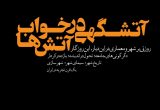
Iranian Modernity and the Transformation of Cities, City Planning, and Architecture: A Century of Experience
A lecture in Persian by Dr. Ali KiafarBeginning with the constitutional movement and subsequent social changes that marked Iranian society in the 20th century, numerous aspects of intellectual life (including literature and the arts) were transformed. Among elements most pertinent to this transformation are discourses on urbanity and identity. Urban concepts, and the identity they forged, impacted the formation, development, and expansion of cities, neighborhoods, and buildings. Focusing as a case study on Tehran and its status as Iran's main urban center, this lecture will explore the complex entanglement of urbanity and identity in modern Iran.
-

Both East and West: A Commentary on the History of Modernity in Iran
A lecture in Persian by Dr. Afshin Matin-AsgariSince the Iranian Revolution of 1979, many observers of Iran have viewed a country torn between Eastern history and ‘Western’ modernity. This divide between religion and secularity has couched the analysis of political philosophy preceding the Revolution in this later dichotomy. Afshin Matin-Asgari instead proposes a revisionist work of intellectual history, challenging many of the dominant paradigms in Iranian and Middle Eastern historiography. In charting the intellectual construction of Iranian modernity, he focuses on broad patterns of influential ideas, which reveal an Iranian modernity that has been sustained by intense intellectual interaction with global ideologies. Turning many prevailing narratives on their heads, the Matin-Asgari concludes that modern Iran can be seen as, culturally and intellectually, both Eastern and Western.
-
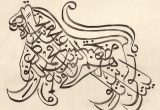
Computers and Challenges of Writing in Persian
A lecture in English by Behrooz Parhami. November 20, 2017.The Persian script has presented some difficulties, ever since printing presses were introduced in Iran in the 1600s. The appearance of typewriters created additional problems and the introduction of digital computers added to the design challenges.
-
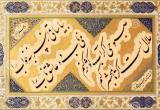
Computers and Challenges of Writing in Persian
A lecture in Persian by Behrooz Parhami. November 19, 2017.The Persian script has presented some difficulties, ever since printing presses were introduced in Iran in the 1600s. The appearance of typewriters created additional problems and the introduction of digital computers added to the design challenges.
-
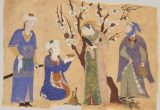
What Kind of Wine did Rudaki Fancy?
A lecture in English by Kamran Talattof. October 9, 2017.One Of the earliest Persian poets, Rudaki (859-941), employed the word wine within a wide semantic register in his poems. However, his unicity is most manifest when the process of winemaking is depicted within a highly allegorical poem entitled “Mother of Wine.”
-

Sexuality and Cultural Change in Iranian Cinema
A lecture in Persian by Kamran Talattof. October 8, 2017.The history of Iranian cinema adequately reflects the construction of gender in Iran. But the expression of sexuality is a problematic notion on a number of levels. In western societies, the preoccupation with human sexuality prompted reflection about human physiology, gender identity, and ethical considerations, resulting in the perception of sex as ontologically separate from mere reproduction, eventually facilitating sexual expression.
-
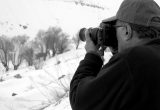
Abbas Kiarostami: The Man and His Arts
Presentations by Shiva Balaghi, Ahmad Karimi-Hakkak, Hamid Naficy, and Ahmad Kiarostami. June 11, 2017.Presentations in English about the Abbas Kiarostami and his artistic projects followed by a panel discussion in Persian moderated by Dr. Nayereh Tohidi. Presentations also included a screening of the short film Take Me Home (2016).
-
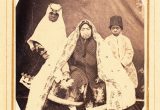
Lost Souls: Photography of African Eunuchs & Female Servants in Qajar Iran
A lecture in English by Pedram Khosronejad. May 1, 2017.The focus of scholars of photography of Qajar Iran, remains fixed solely on photographic content, without any consideration of the materiality of photographic form. Recognizing photographs as material culture is a way to address such a blind spot, and suggests that any methodological use of them requires a more complex and subtle approach.
-
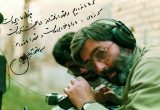
Iran-Iraq War (1980-88) and the Creation of the “Sacred Defense Art”: Painting, Graphic Design, and Cinema
A lecture in Persian by Pedram Khosronejad. April 30, 2017.Pedram Khosronejad is Farzaneh Family Chair and Associate Director for Iranian and Persian Gulf Studies Program (IPGS) at the Oklahoma State University and also associate member of Groupe Sociétés, Religions, Laicités, CNRS-Paris, France. He obtained his PhD at the École des Hautes Études en Sciences Sociales (EHESS) in Paris.
-
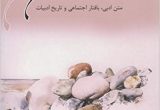
Literature: Its Existence and Its Appearance
A lecture in Persian by Ahmad Karimi-Hakkak. April 9, 2017.Bud o Nemud-e Sokhan (Literature: Its Existence and Its Appearance) brings together twenty select articles which Ahmad Karimi-Hakkak has written and published in the Persian language over three decades of academic service in the United States, and which have a bearing on a novel understanding of the history of Persian Literature.
-
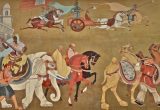
Iran-China Relations in a Changing World
A lecture in Persian by Manochehr Dorraj. March 5, 2017.As two great civilizations with an illustrious imperial past, Iran and China have a long history of trade, political and cultural ties that go back to the ancient Silk Road more than 2100 years ago.
-
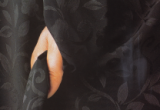
Metaphysical Subversions in Contemporary Iranian Art
A lecture in English by Abbas Daneshvari. February 15, 2017.The directional force of contemporary Iranian art, especially photography, the genius of its expression, is principally the subversion of metaphysical concepts, be they theological, philosophical and/or ontological.
-
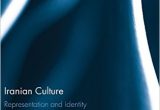
Contested Terrains of Iranian Culture
A lecture in English by Nasrin Rahimieh. February 9, 2017.Throughout modern Iranian history, culture has served as a means of imposing unity and cohesion onto society. The Pahlavi monarchs used it to project an image of Iran as an ancient civilization, re-emerging as an equal to Western nations, while the revolutionaries deployed it to remake the country into an Islamic nation.
-
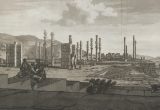
Persepolis After Alexander
A lecture in Persian by Ali Mousavi. January 15, 2017.Ali Mousavi was born and raised in Iran. He studied in Lyon, France, and took his B.A. in Art History, and his M.A. in Archaeology from the University of Lyon, France. He obtained his Ph.D. in archaeology of the ancient Near East from the University of California, Berkeley.
-

Two Book Talks in Persian
Two book talks in Persian by Ghobad Fakhimi and Fredun Hojabri. December 4, 2016.Ghobad Fakhimi's talk is titled: “Iran’s Thirty Years of Oil History: Personal Memoirs Intersecting Declassified Documents” and Fredun Hojabri's talk is titled: “Personal Memoirs Intersecting Nationalization of the Iranian Oil Industry, Student Movements, and the Formations of Aryamehr (Sharif) University of Technology”
-
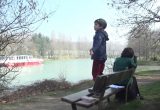
Dust-Flower-Flame
Documentary film screening. Shabnam Tolouei. October 29, 2016Dust-Flower-Flame is a documentary film about the Iranian poet and theologian Tahirih Qurratul Ayn, considered one of the most important figures of the feminist movements in 19th century in Iran.
-

Ehsan Yarshater in Conversation with Mandana Zandian
A book talk by Mandana Zandian. October 9, 2016Mandana Zandian is a graduate of Shahid Beheshti Medical School (1997) and presently works at Cedars Sinai Hospital in Los Angeles, where she is currently engaged in research on aggressive types of advanced cancers.
-

Media Diplomacy Between Iran and the West: War by Other Means
Hamid Naficy. May 13, 2016.Over the past thirty-plus years, normal diplomatic relations between Iran and the West, particularly the United States, have been curtailed, encouraging much of the diplomacy between the two countries to be conducted either in deep secrecy (the Iran Contra Scandal during the Reagan-Rafsanjani presidencies), or allowed to surface in the media.
-

The Concept of Iran: Transition and Revival (Sixth to Ninth Centuries)
Hossein Kamaly, Ali Mousavi, Parvaneh Pourchariati. May 8, 2016. -

The Iconoclastic Icon: The Life, Poetry, and the Letters of Forough Farrokhzad
Farzaneh Milani. April 10 & 11, 2016.Farzaneh Milani is Raymond J. Nelson Professor and Chair of the Department of Middle Eastern and South Asian Languages and Cultures and former Director of Studies in Women and Gender at the University of Virginia.
-

The Cinematic Representation of Architecture
A short film by Tahmineh Milani. April 10, 2016Born in Tabriz in 1960, Tahmineh Milani is one of the most successful Iranian woman filmmakers on the international scene.
-

The Development of Iranian Images of Babism: Babi Religion in Nasekh al-Tavarikh
Nader Saiedi. February 28, 2016.Nader Saiedi received his PhD in Sociology from University of Wisconsin, Madison (1983) and has been teaching social theory and peace studies for three decades.
-

The Significance of Majles Shura and Majles Khobregan Elections in Iran
Kazem Alamdari, Mehrzad Boroujerdi, Akbar Mahdi, Nouradin Pirmoazen. February 14, 2016. -

Iranian Women Writing Transnationally
Mahnaz Attarha, Mehrnoosh Mazarei, Sheida Mohamadi, Paxima Mojavezi, Gina Nahai, Mahdokht Sanati, & Sholeh Wolpe. December 6, 2015. -

From Jinns to Germs: A Genealogy of Pasteurian Islam
Mohamad Tavakoli-Targhi. November 9, 2015.The equivalence of jinns with germs enabled early 20th-century Iranian physicians to offer detailed microbiological explanations for questions of “purity and filth” (taharah va nijasat), questions which had been conventionally elucidated by Shi‘i mujtahids in their responsa (tawzih al-masa’il or risalah ‘amaliyah).
-

The Cyrus Cylinder and the Rights Question
Mohamad Tavakoli-Targhi. November 8, 2015."The Cyrus Cylinder and the Rights Question" explores the interplay between historical memory, social rights and contested conceptions of government and constitutionality in the four decades prior to the 1979 Revolution.
-

Shi’ism and Popular Leadership in the Iranian Constitutional Revolution, 1906-1911: The Case of Muhammad Kazim Khurasani
Mateo M. Farzaneh. October 28, 2015.The Iranian Constitutional Revolution (1906–1911) was the twentieth century’s first such political movement in the Middle East.
-

Changes and Continuities in Iran’s Foreign Relations, Economy, Politics, and Political Culture in the Era of Rouhani
Hussein Banani, Reza Bavafa, Kazem Alamdari and Farideh Frahi. June 7, 2015. -

Children’s Song Writer: Life and Work of Abbas Yamini Sharif
May 31, 2015.Children’s Song Writer presents the life, literary and cultural efforts and accomplishments of Abbas Yamini Sharif (1919-1989), a pioneer in the development of children’s literature in Iran.
-

Six Centuries, Six Years (Iran, 2014)
Film screening followed by discussion. May 3, 2015.The film portrays the endeavors of a group of Iranian master musicians who are trying to locate, restore and record a repertoire of compositions attributed to Abd al-Qadir Maraghi, a prominent composer who lived six centuries ago and greatly influenced Middle Eastern classical music.
-

Imagining a Modern Iran and the Human Sciences
Ali Mirsepassi. April 27, 2015.Why the “human sciences” have become the target of a major government crackdown in Iran today. This talk will focus upon a specific intellectual shift in contemporary Iran.
-

The “Marvelous” Life and Thought of Ahmad Fardid
Ali Mirsepassi. April 26, 2015.This lecture will explore the life and works of the Iranian philosopher and intellectual figure, Ahmad Fardid This ‘master’ intellectual influenced important Iranian thinkers and activists over a period of several decades and is credited with coining the powerful neologism “Gharbzadegi” (Westoxication).
-

Compulsory Veiling (Hijab) and Stealthy Freedom in Iran: A Conversation with Masih Alinejad, Journalist
April 12, 2015.Masih Alinejad is a prominent Iranian journalist, renowned for her critical and courageous writings against the state repression and violation of human rights.
-

Persian Women and Other Lies: Story-telling as Historical Retrieval
Bahiyyih Nakhjavani. March 31, 2015.Plots. Political intrigue. Treachery. The high-handed actions of omnipotent rulers. Death by decree. That’s the world that Bahiyyih Nakhjavani plunges readers into with The Woman Who Read Too Much: Persia in the mid-nineteenth century, a society that clings to the old ways even as the world around it is rapidly transforming.
-

A Panel on Russo-Iranian Political Relations and Intellectural Ties
Maziar Behrooz, Ali Farasati and Afshin Matin-Asgari. February 22, 2015. -

Hafez, Timur and Khosrow of Delhi: A Geo-historical Investigation about the “Shirazi Turk”
Domenico Ingenito. February 8, 2015.Domenico Ingenito (born in 1982 in Vico Equense, Italy; Ph.D. Università di Napoli "L'Orientale") is Assistant Professor of Classical Persian at UCLA.
-

Iran’s Environment, Challenges and Opportunities
Morad Tahbaz. January 25 & 26, 2015.Morad Tahbaz graduated from Colgate University in 1977 with a degree in Liberal Arts and from Columbia University with an MBA in 1983.
-

A Social History of Dance in Iran
Mansoureh Sabtzadeh. December 14, 2014.Mansoureh Sabtzadeh has a Ph.D. in Persian Language and Literature from the Islamic Azad University (Research and Science branch) in Tehran, Iran.
-

Saadi’s Non-Violent Discourse in His Violent Era
Mohammad Navid Bazargan. November 23, 2014Mohammad Navid Bazargan is an Assistant Professor of Persian Literature at Azad University and has been a member of the academic board of the Great Encyclopedia of Islam since 2004.
-

Hidden Liberalism in Modern Iran: The Paradox of Political Struggle
Hussein Banai. October 27, 2014.Hussein Banai is an Assistant Professor in the Department of Diplomacy and World Affairs at Occidental College, and a Research Affiliate at the Center for International Studies at MIT.
-

Looking for Ethnicity in Iran
Rasmus Christian Elling. June 2, 2014.The question of ethnic and national identity constitutes a highly complex and controversial topic in Iran, and only recently have scholars questioned Persian-centrist, majoritarian or nationalist bias in Iranian historiography and research.
-

The Oil City in an Age of Jazz: Nostalgia and Modernity in Abadan, Iran
Rasmus Christian Elling. June 1, 2014.We often hear how oil is both a blessing and a curse that engenders wealth for the select few and misery for many: black gold for the elites and ‘the devil’s excrement’ for the masses.
-

Public Lives and Private Letters: Iran’s First Literary Couple
Houra Yavari. May 4, 2014.Simin Daneshvar (1921-2012) and Jalal Al-e Ahmad (1923-1969) are regarded as Iran's most famous intellectual couple.
-

Russian and Soviet Occupation of Iran in the First World War
Elham Malekzadeh. April 13, 2014.The British and Russian occupations of Iran in WWI have been documented by historians.
-

Reasons behind Safavid decline and the lessons that can be learned from them
Rudi Matthee. March 30, 2014.The decline and fall of Safavid Iran is traditionally seen as the natural outcome of the unrelieved political stagnation and moral degeneration which characterized late Safavid Iran
-

Iran’s Economy: Challenges and Opportunities
Hashem Pesaran. February 24, 2014.Dr. M. Hashem Pesaran is the John Elliot Distinguished Chair in Economics and professor of economics at USC Dornsife, and the director of the Centre in Applied Financial Economics at USC.
-

Sayyad’s, “The Ass”
Mary Apick and Parviz Sayyad. February 16, 2014.An introduction and reading by Mary Apick and Parviz Sayyad
-

Hush: Girls Don’t Scream
Writer/Director Pouran Derakhshandeh. Film Screening. February 8, 2014.Shirin, a small girl growing up in Iran, is tormented by a secret which follows her throughout her life. She eventually takes her redemption into her own hands, in an ending you will never forget.
-

Shahnameh dar Derazna-ye Sadehha: Sargozasht-e Yek Shahkar
Ahmad Karimi-Hakkak. January 19, 2014.Ahmad Karimi-Hakkak is professor of Persian Language and Literature and Iranian Cultures, and Chair of the Department of Middle Eastern Studies at the University of Maryland.
-

The World, the Text and the Wonderful Life: The Pioneering Spirit of Early-Persian Poetry
Ahmad Karimi-Hakkak. January 15, 2014.Ahmad Karimi-Hakkak is professor of Persian Language and Literature and Iranian Cultures, and Chair of the Department of Middle Eastern Studies at the University of Maryland.
-

Honor and Rights: the Politics of Love in Iran
Ziba Mir-Hosseini. January 9, 2014.Iranian politics since the 1979 Revolution is commonly viewed as a polarized conflict between “secular” and “Islamic” ideologies.

